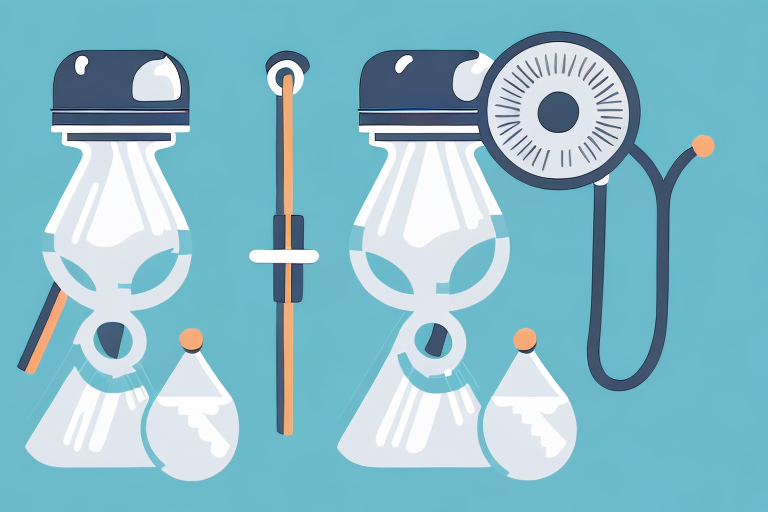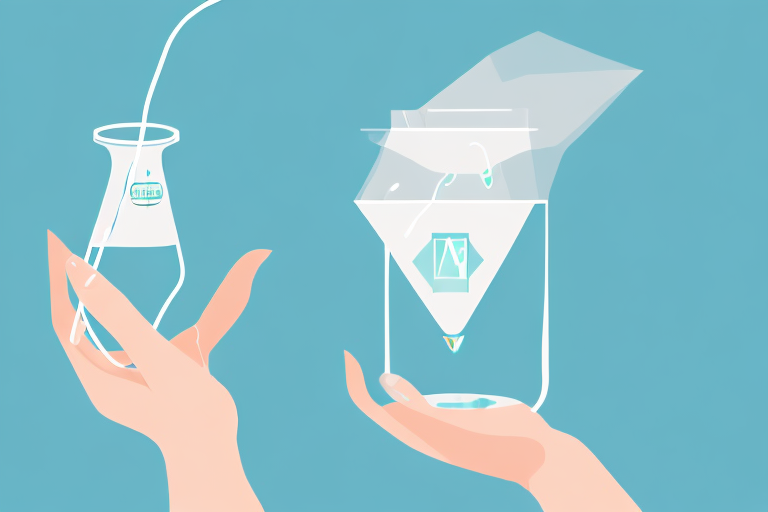What Is the Difference Between Vitamin B12 and Vitamin B Complex?
Vitamins are essential for our body's overall health and functioning. Among these vitamins, B vitamins play a crucial role in various body functions. However, confusion often arises when discussing Vitamin B12 and Vitamin B Complex due to their similar names and functions. In this article, we will discuss the differences, similarities, benefits, and side-effects of these two essential vitamins in detail.

Understanding Vitamins and Their Role in Our Health
Vitamins are organic substances that our body requires to function correctly. Our body cannot produce most vitamins on its own, and we must obtain them through the food we eat or supplements we take. They play a minor role in our body's daily function; however, they support specific body functions and aid in their proper performance.
There are two types of vitamins: fat-soluble and water-soluble. Fat-soluble vitamins, such as Vitamins A, D, E, and K, are stored in the body's fatty tissues and liver. They can stay in the body for days to months, and the body can use them as needed. On the other hand, water-soluble vitamins, such as Vitamin C and all the B vitamins, are not stored in the body and need to be replenished daily. Any excess water-soluble vitamins are excreted in the urine, so it is essential to consume them regularly.
The Importance of Vitamins in Our Diet
Vitamins are vital for our body's various functions, such as maintaining optimal health, supporting nerve function, supporting skin, hair, and nails, and aiding in the production of red blood cells. Studies have also shown specific vitamins' links to preventing chronic diseases, such as heart disease and cancer.
Vitamin D, for example, is essential for bone health as it helps the body absorb calcium. A deficiency in Vitamin D can lead to weak bones, which can lead to conditions such as osteoporosis. Meanwhile, Vitamin E is an antioxidant that helps protect cells from damage caused by free radicals, which can contribute to aging and diseases such as cancer and heart disease.
How Vitamins Support Our Body Functions
Vitamins function to support specific body functions. For instance, Vitamin A is essential for maintaining healthy vision, while Vitamin C supports the immune system. Meanwhile, Vitamin B is a crucial micronutrient that plays a vital role in energy production, nerve function, and red blood cell formation.
Vitamin B12, for example, is essential for the proper functioning of the nervous system and the production of red blood cells. A deficiency in Vitamin B12 can lead to anemia, fatigue, and nerve damage. Vitamin C, on the other hand, is an antioxidant that helps protect the body against infections and promotes the healing of wounds. It is also necessary for the production of collagen, which is essential for healthy skin, hair, and nails.
Overall, vitamins play a crucial role in our body's proper functioning and overall health. It is essential to consume a balanced diet that includes a variety of fruits, vegetables, whole grains, lean proteins, and healthy fats to ensure we are getting all the necessary vitamins and nutrients our body needs. In cases where we cannot obtain enough vitamins through our diet, supplements can be taken under the guidance of a healthcare professional.
The Vitamin B Family: An Overview
Vitamin B is a group of water-soluble vitamins that play a crucial role in maintaining our overall health. Each vitamin has its unique function, and there are eight B vitamins in total.
The B vitamins include thiamine (B1), riboflavin (B2), niacin (B3), pantothenic acid (B5), pyridoxine (B6), biotin (B7), folic acid (B9), and cobalamin (B12). These vitamins are essential for our body's optimal functioning and are often referred to as the energy vitamins due to their role in energy production.
The Role of B Vitamins in Our Body
The different types of B vitamins support different body functions. For instance, Vitamin B6 and B12 help produce neurotransmitters, which are crucial for our brain's optimal functioning. These vitamins also play a crucial role in maintaining our mood and emotional well-being.
Vitamin B9, also known as folic acid, is crucial for cell growth and division. It is especially important for pregnant women as it supports proper fetal development and reduces the risk of birth defects.
Vitamin B1, also known as thiamine, helps the body turn food into energy, which is essential for our body's optimal functioning. Vitamin B3, also known as niacin, plays a crucial role in cholesterol synthesis and helps maintain healthy skin.
The Different Types of B Vitamins
As mentioned earlier, there are eight B vitamins in total, each with its unique function. Vitamin B12 is the most well-known, and it is crucial for maintaining healthy nerve cells and producing DNA. It is also essential for the formation of red blood cells.
Vitamin B2, also known as riboflavin, plays a critical role in maintaining healthy vision and skin. It also helps the body convert food into energy and is essential for our body's optimal functioning.
Vitamin B5, also known as pantothenic acid, is crucial for our body's energy production and helps reduce stress levels. It also plays a role in maintaining healthy skin and hair.
Overall, the B vitamins are essential for our body's optimal functioning and overall health. A balanced diet rich in whole grains, fruits, vegetables, and lean protein can provide us with the necessary vitamins and minerals to maintain our health.
Vitamin B12: Functions, Sources, and Benefits
The Role of Vitamin B12 in Our Body
Vitamin B12 is one of the essential vitamins required by our body for optimal functioning. It is a water-soluble vitamin that plays a vital role in various body processes, such as nerve function, DNA synthesis, and red blood cell formation. It also helps regulate mood and support cognitive function.
Vitamin B12 is involved in the metabolism of every cell in the body. It helps to produce DNA, the genetic material that carries the instructions for the development, growth, and reproduction of all living organisms. It also plays a crucial role in the formation of red blood cells, which carry oxygen from the lungs to the rest of the body.
Moreover, Vitamin B12 is essential for the proper functioning of the nervous system. It helps to maintain the myelin sheath that surrounds and protects nerve fibers, allowing them to transmit messages efficiently. It also helps to produce neurotransmitters, the chemicals that allow nerve cells to communicate with each other.
Dietary Sources of Vitamin B12
Vitamin B12 is primarily found in animal products, such as meat, poultry, fish, and dairy products. Some of the best sources of Vitamin B12 include beef liver, clams, salmon, tuna, milk, cheese, and eggs. For this reason, vegetarians and vegans are often at risk of Vitamin B12 deficiency and may need to rely on supplements or fortified foods to meet the daily recommended intake.
Fortified breakfast cereals, plant-based milk alternatives, and nutritional yeast are some of the common sources of Vitamin B12 for vegetarians and vegans. However, it is essential to read the labels carefully to ensure that these products contain adequate amounts of Vitamin B12.
In addition to dietary sources, Vitamin B12 can also be obtained through supplements. Vitamin B12 supplements are available in various forms, such as tablets, capsules, and injections. However, it is advisable to consult a healthcare professional before taking any supplements.
Health Benefits of Vitamin B12
Vitamin B12 offers various health benefits to our body. Some of the benefits include:
- Supporting Nerve Function: Vitamin B12 is essential for the proper functioning of the nervous system. It helps to maintain the myelin sheath that surrounds and protects nerve fibers, allowing them to transmit messages efficiently. It also helps to produce neurotransmitters, the chemicals that allow nerve cells to communicate with each other.
- Promoting Healthy Skin and Hair: Vitamin B12 is essential for the growth and maintenance of healthy skin and hair. It helps to regulate the production of sebum, the oily substance that moisturizes the skin and hair. It also helps to promote cell turnover, which is essential for maintaining healthy skin and hair.
- Aiding in the Production of Red Blood Cells: Vitamin B12 is necessary for the production of red blood cells, which carry oxygen from the lungs to the rest of the body. A deficiency in Vitamin B12 can lead to a type of anemia called megaloblastic anemia, which can cause fatigue, weakness, and shortness of breath.
- Regulating Mood: Vitamin B12 plays a crucial role in regulating mood and preventing depression. It helps to produce neurotransmitters, such as serotonin and dopamine, which are essential for maintaining a positive mood.
In conclusion, Vitamin B12 is an essential nutrient required by our body for optimal functioning. It plays a vital role in various body processes, such as nerve function, DNA synthesis, and red blood cell formation. It is primarily found in animal products, and vegetarians and vegans may need to rely on supplements or fortified foods to meet the daily recommended intake. Vitamin B12 offers various health benefits, including supporting nerve function, promoting healthy skin and hair, aiding in the production of red blood cells, and regulating mood.
Vitamin B Complex: A Combination of Essential B Vitamins
What is a Vitamin B Complex?
A Vitamin B Complex is a combination of all eight essential B Vitamins that work together to regulate various body functions such as energy metabolism, brain function, and DNA synthesis.
The B Vitamins are water-soluble, which means that they dissolve in water and are not stored in the body. This is why it is essential to consume them daily through a balanced diet or supplements.
The Components of Vitamin B Complex
The eight vitamins that make up the Vitamin B complex are B1 (thiamine), B2 (riboflavin), B3 (niacin), B5 (pantothenic acid), B6 (pyridoxine), B7 (biotin), B9 (folic acid), and B12 (cobalamin).
Each of these vitamins offers its unique benefits. For example, B1 helps the body convert food into energy, while B2 plays a crucial role in maintaining healthy skin and eyes. B3 helps with cholesterol control, while B5 aids in hormone production. B6 is essential for brain development and function, while B7 supports healthy hair, skin, and nails. B9 is crucial for fetal development during pregnancy, and B12 is necessary for red blood cell formation and nerve function.
When combined in a B-complex supplement, these vitamins can offer more significant health benefits than taking individual supplements.
Health Benefits of Vitamin B Complex
Vitamin B Complex supplements offer various benefits to our body, including:
- Promoting healthy hair, skin, and nails
- Supporting a healthy immune system
- Supporting energy metabolism
- Promoting brain health and cognitive function
- Reducing the risk of birth defects during pregnancy
- Lowering the risk of heart disease and stroke
It is important to note that while Vitamin B Complex supplements can offer many health benefits, they should not be used as a substitute for a healthy, balanced diet. It is always best to consult with a healthcare professional before starting any new supplement regimen.
In conclusion, Vitamin B Complex is a crucial combination of essential B Vitamins that work together to support various body functions. By incorporating them into our diet or supplement routine, we can reap the numerous health benefits they offer.
Comparing Vitamin B12 and Vitamin B Complex
Vitamins are essential nutrients required by the body to carry out various functions. Among all the vitamins, the Vitamin B group plays a crucial role in maintaining overall health. The Vitamin B group consists of eight different vitamins, and Vitamin B12 is one of them. In this article, we will compare Vitamin B12 and Vitamin B Complex and discuss their similarities and differences.
Similarities Between Vitamin B12 and Vitamin B Complex
As mentioned earlier, Vitamin B12 is one of the eight essential vitamins of the Vitamin B complex. Hence, Vitamin B Complex supplements also contain Vitamin B12. Both Vitamin B12 and Vitamin B Complex play a crucial role in energy production, DNA synthesis, and nerve function. They are also water-soluble vitamins, which means that they are not stored in the body and must be replenished regularly through diet or supplements.
Vitamin B12 and Vitamin B Complex are essential for maintaining a healthy nervous system. They help in the production of myelin, a fatty substance that surrounds and protects nerve fibers. A deficiency in these vitamins can lead to nerve damage and neurological disorders.
Key Differences Between Vitamin B12 and Vitamin B Complex
The main difference between Vitamin B12 and Vitamin B Complex is that Vitamin B12 is just one vitamin, while Vitamin B Complex is a combination of eight B vitamins. Vitamin B12 plays a vital role in maintaining nerve function and DNA synthesis, while Vitamin B Complex promotes healthy skin, hair, nails, energy metabolism, and brain function.
Vitamin B Complex consists of eight different vitamins, including Thiamin (B1), Riboflavin (B2), Niacin (B3), Pantothenic Acid (B5), Pyridoxine (B6), Biotin (B7), Folate (B9), and Cobalamin (B12). Each of these vitamins has its own unique function in the body.
Thiamin (B1) helps in converting food into energy, while Riboflavin (B2) is essential for healthy skin and eyes. Niacin (B3) aids in digestion and promotes healthy skin. Pantothenic Acid (B5) is necessary for the production of red blood cells and hormones, while Pyridoxine (B6) helps in the production of neurotransmitters such as serotonin and dopamine.
Biotin (B7) is essential for healthy hair, skin, and nails, while Folate (B9) is necessary for the production of red blood cells and DNA synthesis. Cobalamin (B12) is crucial for maintaining nerve function and DNA synthesis.
In conclusion, while both Vitamin B12 and Vitamin B Complex are essential for maintaining overall health, they differ in their composition and functions. Vitamin B12 is just one vitamin, while Vitamin B Complex consists of eight different B vitamins. Vitamin B12 plays a crucial role in nerve function and DNA synthesis, while Vitamin B Complex promotes healthy skin, hair, nails, energy metabolism, and brain function.
Choosing the Right Vitamin B Supplement for Your Needs
Vitamin B is a crucial nutrient that plays a vital role in maintaining a healthy body. It helps in the formation of red blood cells, supports brain function, and aids in the metabolism of food into energy. However, not everyone gets enough Vitamin B from their diet alone. That's where supplements come in.
Factors to Consider When Selecting a Supplement
When selecting a Vitamin B supplement, there are several factors you should consider. Firstly, ensure that it contains all the essential Vitamin B vitamins, including B12. Vitamin B12 is vital for the proper functioning of the nervous system and the formation of red blood cells. It is also essential for DNA synthesis.
Secondly, consider your specific needs, such as if you are a vegetarian or vegan. This is because Vitamin B12 is primarily found in animal products, and vegetarians and vegans may not get enough of it from their diet alone. If you fall into this category, look for a supplement that contains Vitamin B12 in its active form, methylcobalamin.
Thirdly, talk to your healthcare provider to determine if a Vitamin B supplement is appropriate for you. Certain medical conditions or medications may interact with Vitamin B supplements, so it is essential to seek professional advice before starting any new supplements.
Recommended Daily Intake of B Vitamins
The recommended daily intake of B Vitamins varies depending on the specific type of B Vitamin. However, the overall recommended daily intake of all B Vitamins combined is 2.4 micrograms for adults. For pregnant and breastfeeding women, the recommended daily intake may be higher.
It is also worth noting that some people may require higher doses of certain B Vitamins. For example, individuals with a genetic mutation called MTHFR may need higher doses of Vitamin B6 and B12 to prevent deficiencies.
Additionally, some people may benefit from taking a Vitamin B complex supplement, which contains all eight B Vitamins. This can be particularly useful for individuals who have a poor diet or are at risk of deficiencies.
In conclusion, selecting the right Vitamin B supplement can be a daunting task, but by considering your specific needs, seeking professional advice, and ensuring that the supplement contains all the essential B Vitamins, you can make an informed decision that will benefit your health and wellbeing.
Potential Side Effects and Interactions of Vitamin B12 and Vitamin B Complex
Possible Side Effects of Vitamin B12 and Vitamin B Complex
Vitamin B12 and Vitamin B Complex supplements are essential for maintaining good health and preventing deficiency symptoms. However, like any other supplement, they can have side effects if taken in high doses or for an extended period.
Some of the common side effects of Vitamin B12 and Vitamin B Complex supplements include skin flushing, nausea, and stomach upset. These side effects usually subside once the body adjusts to the supplement. However, if you experience severe or persistent symptoms, you should stop taking the supplement and consult your healthcare provider.
People with specific medical conditions, such as kidney disease or liver disease, should talk to their healthcare provider before taking Vitamin B supplements. This is because these conditions can affect how the body processes and absorbs the supplement, leading to potential side effects.
Interactions with Other Medications and Supplements
While Vitamin B12 and Vitamin B Complex supplements are generally safe and well-tolerated, they can interact with certain medications and supplements, leading to adverse effects.
For instance, Vitamin B12 supplements can interfere with certain antibiotics and medication used to lower cholesterol levels. Therefore, it is essential to talk to your healthcare provider to determine if a Vitamin B supplement is appropriate for you and if it will interact with any medications or supplements you are taking.
Additionally, taking high doses of Vitamin B6 for an extended period can lead to nerve damage, which can be irreversible. Therefore, it is crucial to follow the recommended dosage and duration of the supplement to avoid potential interactions and side effects.
In conclusion, Vitamin B12 and Vitamin B Complex supplements are essential for maintaining good health and preventing deficiency symptoms. However, like any other supplement, they can have side effects and interact with certain medications and supplements. Therefore, it is crucial to talk to your healthcare provider before taking any Vitamin B supplement to determine if it is appropriate for you and to avoid potential interactions and side effects.
Conclusion: Understanding the Unique Benefits of Vitamin B12 and Vitamin B Complex
Vitamin B12 and Vitamin B Complex both play a vital role in our body's optimal functioning. Vitamin B12 is a stand-alone vitamin that plays a crucial role in maintaining nerve function and DNA synthesis. Meanwhile, Vitamin B Complex is a combination of all eight essential B Vitamins that support various body functions such as energy metabolism, brain function, and DNA synthesis. When selecting a Vitamin B supplement, ensure that it meets your specific nutritional needs and consult your healthcare provider to determine if it is appropriate for you.
© 2024 IV Fluids | All Rights Reserved | Powered By OMG Marketing











